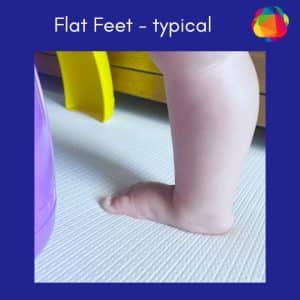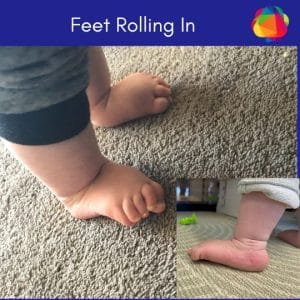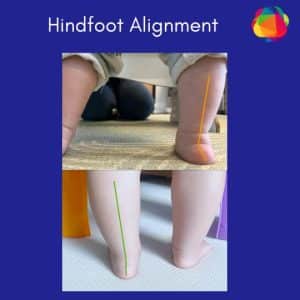Did you know that babies are actually MEANT to have flat feet?!?! It is totally normal at this age – even 20% of adults have ‘flat feet’ and having flat feet doesn’t necessarily mean you’ll have pain or problems.
The anatomy and biomechanics of a baby’s skeleton is completely different to ours as adults. Baby feet are highly padded with fat and super flexible. Over time (the first few years) those fat pads slowly start to disappear, making the foot arches become more visible.
This little bub has a pretty typical foot orientation – you can see it’s quite flat to the floor, as we expect, and the whole of the foot makes contact with the ground.

This little guy has a slightly different orientation. He has very flexible ankles (not necessarily an issue) which means his feet tend to ‘roll in’ potentially as a balance strategy or because it might be hard work to control the foot position all the time. Again – not immediately a concern, but if he’s doing it ALL the time he stands and can’t hold his feet in a variety of different positions and if he’s struggling to progress his motor skills, then it’s worth checking in to get some support.

From behind we can also see the difference in alignment. Feet that ‘roll in’ may be more ‘everted’ where the bottom of the heel sits on the outer edge of the shin. A more typical alignment has the heel sitting pretty much directly under the middle line of the shin.

Please check in with a paediatric physio if you find that your little one:
- Is behind in their motor development
- Has pain
- Has stiff feet
- Have feet that roll in excessively
- Is constantly tripping and falling
- Has one differently shaped foot
Paediatric Physiotherapists can assess alignment, body structure, function, development… ALL the things! Sometimes working through specific movement activities can help to build control around the foot and ankle, as well as balance responses. Sometimes a shoe might be recommended to support your little one to move and play well, there’s a whole range if strategies we can give depending on your concern 🙂
